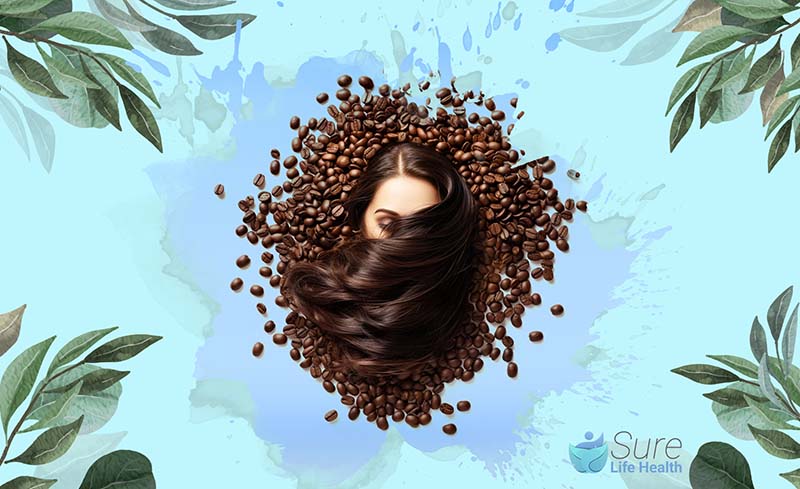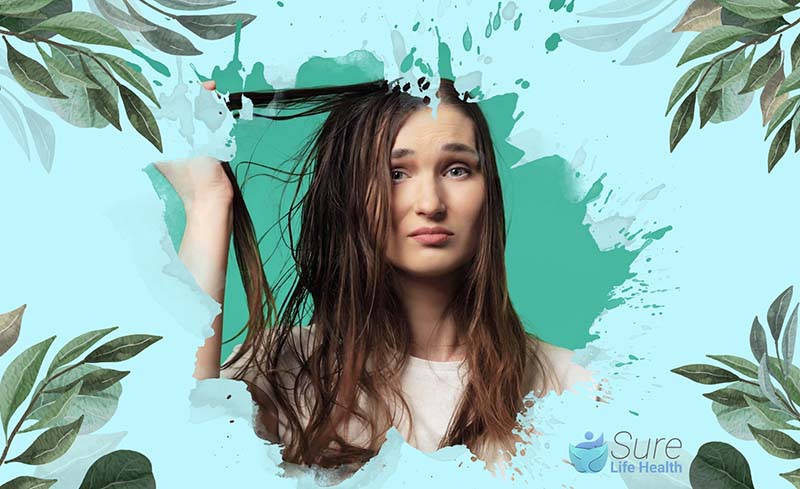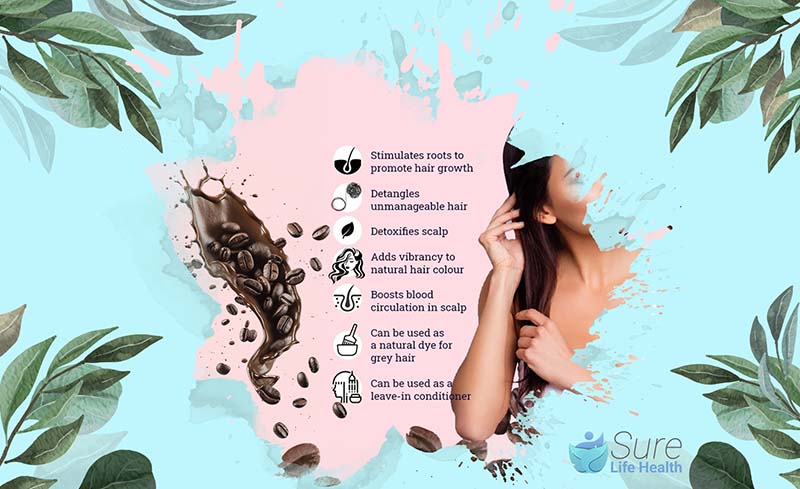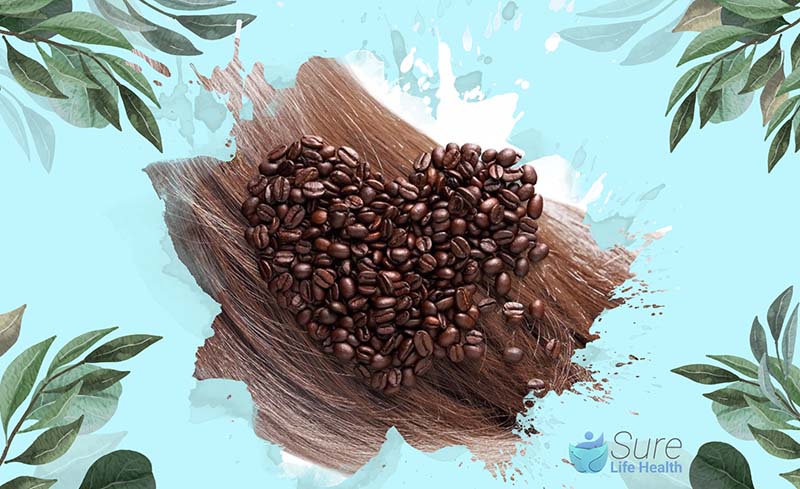In our previous discussion, we explored how egg yolk can enhance your hair’s health. This time, Sure Life Health delves into the topic of “Is coffee good for your hair?”
Coffee, a readily available source of antioxidants, not only perks up your morning but might also rejuvenate your hair. We’ll use scientific findings to examine if coffee truly benefits hair health, focusing on reducing hair loss and increasing softness and shine.
Additionally, you’ll be guided through making a coffee rinse at home, along with essential tips to optimize its effectiveness.
Is Coffee Good for Your Hair?
Yes, It Is Proven by Science.
Caffeine’s role in hair care extends beyond old wives’ tales; it’s a fact supported by robust scientific research. Various studies have highlighted caffeine’s potential as a natural remedy for hair loss.
A pivotal 2007 study demonstrated that caffeine stimulates hair follicles and promotes hair growth. Impressively, it was also found to mitigate the adverse effects of testosterone on hair growth, making it a viable option for treating hereditary hair loss, or androgenetic alopecia.
Further research in 2014 showed that caffeine could extend the hair shaft and prolong the active growth phase of hair for both genders. A 2018 study even compared a caffeine-based topical solution favorably with minoxidil 5%, a common hair loss treatment. Caffeine showed almost similar results.
Clearly, caffeine is more than just a stimulant; it’s a scientifically validated ally for hair health.

Potential Side Effects of Applying Coffee to Your Hair
While the benefits of coffee for hair are significant, certain precautions should be noted:
- Hair Staining: For those with lighter hair, be wary of direct coffee applications as its pigments might leave a temporary tint. Instead, consider caffeine-infused hair products designed to offer benefits without altering hair color.
- Excessive Caffeine Consumption: Although topical applications are beneficial. But don’t let it lead you to drinking excessive amounts of coffee to enhance hair growth. This can lead to health issues such as an increased heart rate, nervousness, and sleep disturbances. Moderation is key.
- Dryness and Brittle Hair: Coffee has a drying effect on hair. Too frequent use of DIY coffee treatments could lead to brittle or dry strands.

Important Considerations Before Using Coffee for Hair Care
Before integrating coffee into your hair care routine, consider the following:
- Always allow your brewed coffee to cool completely before applying it to your hair or transferring it into a spray bottle to avoid scalp burns.
- Use powdered coffee for DIY hair masks. It mixes more evenly, and you can avoid the potential pitfalls of flavored coffee that often contains sugar.
- If you experience any allergic reactions, stop using. Whether it’s from homemade or store-bought coffee products, stop using them immediately. Then, consult a healthcare professional for guidance.
Note: When making your own coffee-based hair treatments, always opt for organic, unflavored coffee. This helps you to ensure you’re using the most natural and effective formulation. Thus, you can avoid any unwanted chemicals or additives that might interfere with the desired outcomes.
4 Benefits of Coffee for Hair
Coffee Boosts Natural Shine
Coffee is much more than just a source of caffeine. It’s also loaded with antioxidants like flavonoids that defend your hair against environmental damage and oxidative stress. These properties not only strengthen the hair follicles but also enhance the natural sheen of your hair.
Coffee’s gentle nature means it won’t strip your hair of its natural oils. Instead, it enhances moisture retention, leading to a lustrous finish.
Coffee Improves Hair Softness
Struggling with frizzy hair or those days when your hair seems unmanageable, dull, and lifeless? Coffee offers a natural and swift remedy. A simple rinse with coffee can transform the appearance of your hair.
Its rich antioxidant content and the ability to boost scalp circulation not only alleviate dullness but also help your hair maintain its natural moisture. This results in softer, more manageable hair that looks healthy rather than brittle and damaged.

Coffee Reduces Grey Hair
Are you looking for a natural way to cover grey hair? A coffee rinse might be your solution. The dark pigments in coffee can stain hair, providing a temporary tint that blends well with white or grey strands. This method is particularly effective for those needing a quick fix.
For the best results, use a strong brew like espresso, which can offer a deeper color. Coffee stains are especially beneficial for those with naturally brown hair as it blends seamlessly, helping to mask grey hair without any obvious signs of dyeing.

Coffee Promotes Hair Growth
Hair loss, a common issue with aging among both men and women, can be combated with topical coffee applications. A landmark 2007 study highlighted caffeine’s ability to block the effects of dihydrotestosterone (DHT), a hormone known to cause hair loss.
Caffeine not only promotes the elongation of the hair shaft, making the roots longer and wider, but it also extends the active growth phase of hair follicles. Additionally, as a stimulant, caffeine boosts blood flow to the scalp. This effect enhances hair growth and contributes to a fuller, thicker appearance.
DIY Coffee Rinse for Hair Care
Creating a coffee rinse is straightforward and beneficial for both hair growth and color enhancement. Here’s how you can do it:
- Ingredients: You’ll need 2 to 4 cups of brewed coffee, cooled completely. Adjust the amount based on your hair length.
- Application: Pour the cooled coffee into a spray or applicator bottle. After washing and conditioning your hair, while it’s still wet, evenly apply the coffee. Ensure all strands are thoroughly saturated.
- Processing: Massage the coffee into your scalp and hair for enhanced absorption. Cover with a plastic shower cap and let the rinse work for about 20 minutes.
- Optional Moisture Boost: For added hydration, mix some leave-in conditioner with the coffee before application.
- Final Steps: Rinse your hair with cool or lukewarm water, then gently pat dry.
Note: If using the rinse primarily for coloring, you might need to repeat the process several times to achieve the desired shade.

For people with busy lives, using hair care products that contain coffee can be a great and convenient option. These products offer the same benefits as homemade coffee treatments but without the hassle of making them yourself.
Instead of spending time preparing DIY hair care, you can simply use these ready-made products to enjoy the advantages of coffee for your hair. This makes it easier to take care of your hair even when you don’t have much time.
Conclusion
If someone asks, “Is coffee good for hair?”, you can confidently say yes now. Coffee is not just a beloved morning beverage; it’s a scientifically proven, readily available remedy that can enhance your hair’s health.
Whether you’re looking to stimulate hair growth, increase softness and shine, or subtly mask grey hairs, coffee offers a versatile solution. You can easily create a homemade coffee rinse or opt for hair care products infused with coffee to reap these benefits. Remember to use cooled, brewed coffee or coffee powder for your treatments to avoid scalp irritation. Always cease use if you experience any allergic reactions.
Do you look at your daily morning cup differently now? Consider sharing these tips with your friends and create soft, shiny, healthy hair-dos together. If there are any hair-related questions, why don’t you let us know in the comment section below?
Don’t miss the opportunity to explore further insightful content from SurelifeHealth.
Professor Gaye Cunnane, PhD, MB, FRCPI
As the Director of Health and Wellbeing at RCPI, Professor Gaye Cunnane is at the helm of initiatives aimed at enhancing the health and well-being of RCPI Trainers and Trainees. Her role extends beyond administration; she is also a respected clinical professor of rheumatology and a consultant rheumatologist at Trinity College Dublin (TCD) and St James’s Hospital. Prof. Cunnane’s medical journey began at TCD, where she graduated from medical school, and her path has been marked by both clinical and academic excellence.
After completing her basic clinical training in medicine, she embarked on PhD studies at University College Dublin and St Vincent’s University Hospital. Her research during this period was focused on prognostic markers in early inflammatory arthritis, a project that saw her collaborating with esteemed universities across Europe, including in Switzerland, The Netherlands, the UK, and Sweden.
Prof. Cunnane’s career took her to the University of California, San Francisco, where she spent three years delving into research on new treatments for lupus. Her academic prowess led her to the University of Leeds in 2001 as a senior lecturer, before returning to Ireland in 2003 to assume her current roles. She has also served as the National Specialty Director for Rheumatology training in Ireland, Programme Director for Basic Specialist Training with RCPI, and as a past President of the Irish Society for Rheumatology.
PUBLISHED ARTICLES
“Rheumatic disease differentiation using immunoglobulin G sugar printing by high-density electrophoresis”: Published in The Journal of Rheumatology, this study reflects her in-depth investigation into rheumatic diseases.
“Benefits of exercise in patients with rheumatoid arthritis: a randomized controlled trial”: This research work, highlighting the positive impact of exercise on rheumatoid arthritis, underscores Prof. Cunnane’s dedication to practical, patient-centered research.
Additionally, Prof. Cunnane has made notable contributions to the Annals of the Rheumatic Diseases, discussing early referral, diagnosis, and treatment of rheumatoid arthritis. She has also been involved in a study on the NCBI platform investigating exercise benefits in rheumatoid arthritis patients.
Professor Gaye Cunnane’s career is a testament to her commitment to improving patient outcomes in rheumatology through rigorous research, clinical excellence, and dedicated teaching. Her work continues to influence the field of rheumatology, both in Ireland and internationally.

